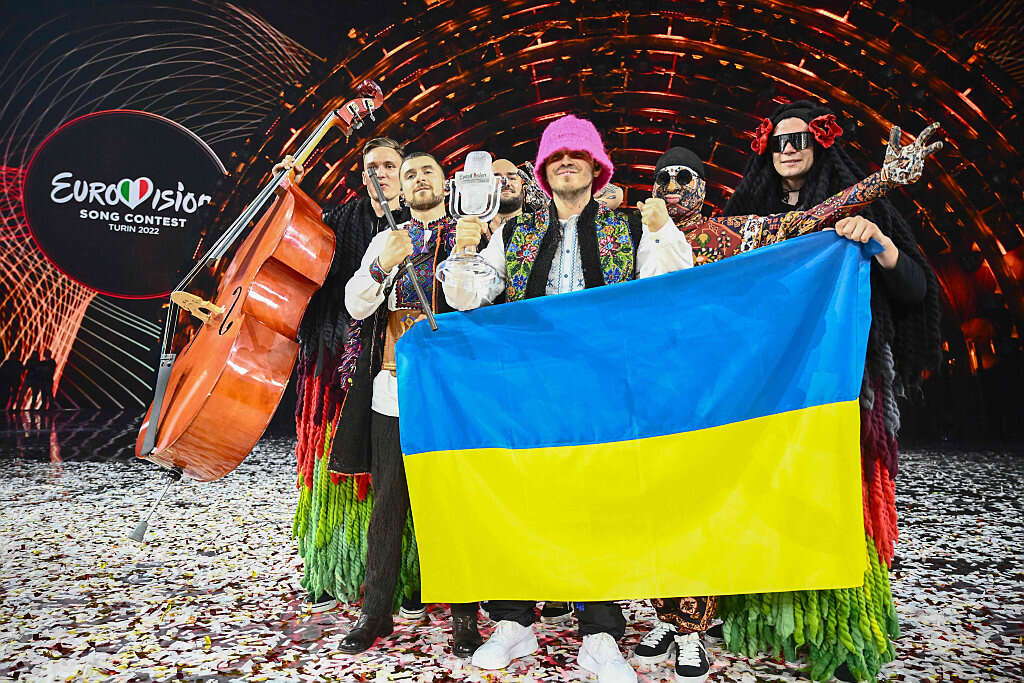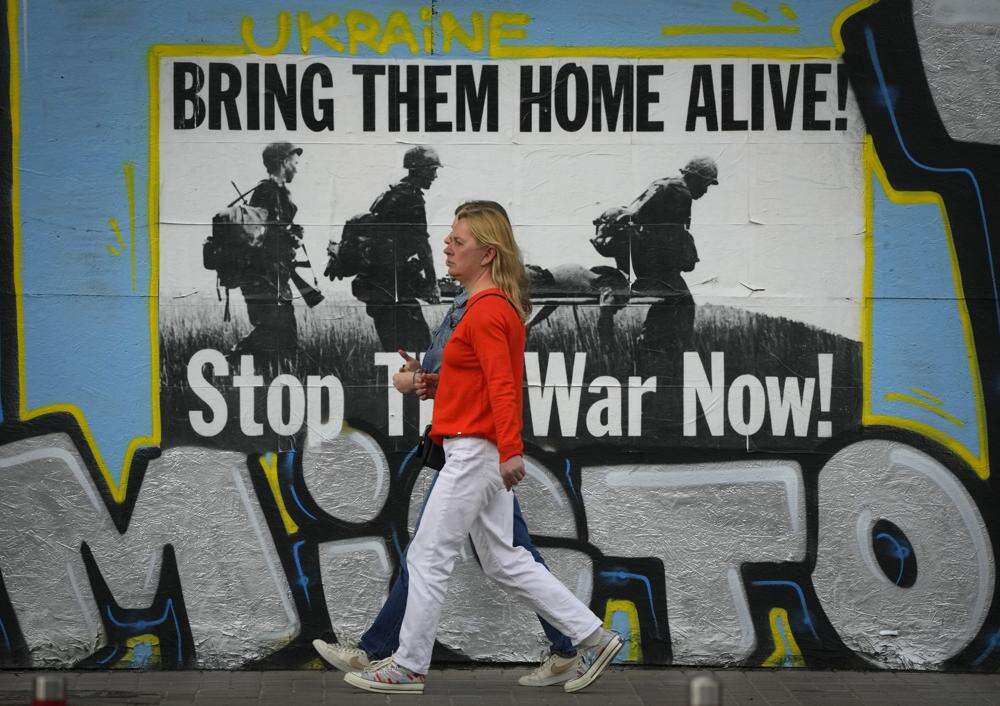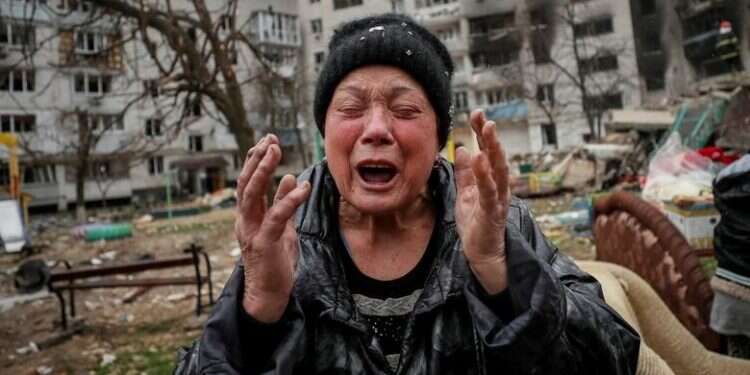Almost three months after Russia shocked the world by invading Ukraine, its military faced a bogged-down war, a revitalized NATO and a defending country invigorated by its win in a hugely popular pan-European music competition Sunday.
Follow Israel Hayom on Facebook, Twitter, and Instagram
Ukraine's leader hailed the country's morale-boosting victory in the Eurovision Song Contest. With Western military officials saying Russia's invasion had lost momentum, Ukrainian President Volodymyr Zelenskyy vowed his nation would claim the customary honor of hosting the next annual competition.
"Step by step, we are forcing the occupiers to leave the Ukrainian land," Zelenskyy said.
Ukraine's Kalush Orchestra won the glitzy, televised Eurovision contest with its song "Stefania," which has become a popular anthem among Ukrainians during the war. Votes from home viewers across Europe cemented the victory.
Top NATO diplomats, including US Secretary of State Antony Blinken, gathered Sunday in Berlin to discuss the war and moves by Finland, Sweden and other countries to join the Western military alliance over mounting worry about Russia's intensions.
"The brutal invasion [by] Russia is losing momentum," NATO Deputy Secretary-General Mircea Geoana said. "We know that with the bravery of the Ukrainian people and army, and with our help, Ukraine can win this war."
Russian President Vladimir Putin has justified the war in Ukraine by claiming it was a response to NATO's expansion in Eastern Europe.
The assessments of Russia's war performance by Ukraine's supporters came as Russian troops retreated from around Kharkiv, Ukraine's second-largest city, after bombarding it for weeks. They and Ukraine's fighters are engaged in a grinding battle for the country's eastern industrial heartland, the Donbas.
Russia has now likely lost one-third of the ground combat forces it committed in February and continues to suffer "consistently high levels of attrition" while failing to achieve any substantial territorial gains over the past month, Britain's Defense Ministry said in its daily intelligence update Sunday.

"Russia's Donbas offensive has lost momentum and fallen significantly behind schedule," the ministry said on Twitter, adding that the forces are suffering "continued low morale and reduced combat effectiveness ... Under the current conditions, Russia is unlikely to dramatically accelerate its rate of advance over the next 30 days."
With Russian forces now pulling back from the northeastern city of Kharkiv, Ukraine's military has said Moscow is now focusing on guarding supply routes, while launching mortar, artillery and airstrikes in the eastern region of Donetsk in an attempt to deplete Ukrainian forces and destroy fortifications.
Kharkiv, which is near the Russian border and only 80 kilometers (50 miles) southwest of the Russian city of Belgorod, has undergone weeks of intense shelling. The largely Russian-speaking city with a prewar population of 1.4 million was a key military objective earlier in the war, when Moscow hoped to capture and hold major cities.
Russia also hit railways, factories and other infrastructure across Ukraine. A Russian missile hit "military infrastructure facilities" in the Yavoriv district of western Ukraine, near the border with Poland early Sunday morning. There was no immediate information on dead or injured, said Lviv Regional Governor Maksym Kozytskyy on the Telegram messaging app.
Russia has been targeting rail facilities and other critical infrastructure in western Ukraine a major gateway for NATO-supplied weapons. Western officials have said despite the attacks there has been no appreciable impact on Ukraine's ability to resupply its forces.
After failing to capture Kyiv following the Feb. 24 invasion, Putin has shifted his focus eastward to the Donbas, aiming to encircle Ukraine's most experienced and best-equipped troops, and seize territory still under Ukraine's control.
Russian forces control a horseshoe-shaped swath of territory in the Ukrainian areas of Donetsk and Luhansk, which make up the Donbas region, the border area where Ukraine has battled Moscow-backed separatists since 2014.
Airstrikes and artillery barrages make it extremely dangerous for journalists to move around in the east, hindering efforts to get a full picture of the fighting. But it appears to be a back-and-forth slog without major breakthroughs on either side.

In his nightly address Saturday, Zelenskyy said "the situation in Donbas remains very difficult" and Russian troops were "still trying to come out at least somewhat victorious."
In the southern Donbas, the Azov Sea port of Mariupol is now largely in Russian control, except for the few hundred troops left in the Azovstal steel factory.
A convoy of between 500 and 1,000 cars carrying civilians out of the city was reportedly able to reach the Ukrainian-held city of Zaporizhzhia on Saturday, while Ukrainian Deputy Prime Minister Iryna Vereshchuk said authorities were negotiating the evacuation of 60 severely wounded troops at the steelworks.
Refugees recalled the "devastating" escape after reaching safety. Nikolai Pavlov, a 74-year-old retiree, said he had lived in a basement for a month after his apartment was destroyed. A relative using "secret detours" managed to get him out of Mariupol to Berdyansk.
"We barely made it, there were lots of elderly people among us ... the trip was devastating. But it was worth it," he said after the convoy arrived in the dark.
Iryna Petrenko, 63, said she had stayed initially to take care of her 92-year-old mother, who subsequently died. "We buried her next to her house, because there was nowhere to bury anyone," she said, adding that for a time, Russian authorities had not allowed large numbers of cars to leave.
Only the port city's vast Azovstal steel works is still in the hands of Ukrainian fighters after a prolonged battle.
"My parents' house was hit by an aerial strike, all the windows got blown out," said Yulia Panteleeva, 27, who along with other family members had been absent. "I can't stop imagining things that might have happened to us had we stayed at home."
Subscribe to Israel Hayom's daily newsletter and never miss our top stories!
Turkey's presidential spokesman, Ibrahim Kalin, said the country had offered to evacuate wounded Ukrainian soldiers and civilians by ship from Azovstal, according to official state broadcaster TRT. Kalin said Russian and Ukrainian officials had not given Turkey a clear answer regarding the evacuation plan, but that it was still on the table.
The invasion of Ukraine has other countries along Russia's flank worried they could be next, and in the past week, the president and prime minister of Finland said they favor seeking NATO membership.
Sweden's governing Social Democratic Party is set to announce its decision on NATO membership Sunday. If it comes out in favor, as is expected, an application to join the Western military alliance could happen within days.
In a phone call Saturday, Putin told Finnish President Sauli Niinisto that there are no threats to Finland's security and joining NATO would be an "error" and "negatively affect Russian-Finnish relations."
NATO operates by consensus, and the Nordic nations' potential bids were thrown into question Friday when Turkish President Recep Tayyip Erdogan said his country is "not of a favorable opinion."
Turkish Foreign Minister Mevlut Cavusoglu accused the two countries of supporting Kurdish rebel groups, but suggested Turkey would not necessarily block them joining NATO.
"These are the issues that we need to talk, of course, with our NATO allies," he said.




